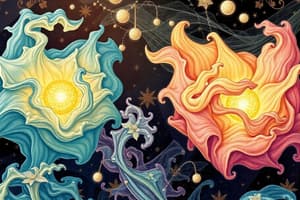Podcast
Questions and Answers
Which of the following best describes a compound?
Which of the following best describes a compound?
- A pure substance made of only one type of atom.
- A group of atoms bonded together.
- A substance made up of two or more different elements chemically combined. (correct)
- A basic unit of matter that cannot be broken down.
What does the principle of Conservation of Mass imply in a chemical reaction?
What does the principle of Conservation of Mass imply in a chemical reaction?
- Matter can be created depending on the reaction conditions.
- The total mass of reactants equals the total mass of products. (correct)
- Matter can be destroyed if enough energy is supplied.
- Mass can vary significantly during a reaction.
Which of the following is NOT an indicator of a chemical reaction?
Which of the following is NOT an indicator of a chemical reaction?
- Gas production
- Color change
- Temperature change
- State of matter (correct)
In terms of scientific reasoning, what is primarily relied upon to draw conclusions?
In terms of scientific reasoning, what is primarily relied upon to draw conclusions?
Which statement accurately defines a molecule?
Which statement accurately defines a molecule?
Which characteristic best defines solids?
Which characteristic best defines solids?
What is a common property of liquids?
What is a common property of liquids?
Which of the following is an example of a gas?
Which of the following is an example of a gas?
How do the particles in gases differ from those in solids?
How do the particles in gases differ from those in solids?
Which example correctly identifies a solid?
Which example correctly identifies a solid?
What property distinguishes liquids from gases?
What property distinguishes liquids from gases?
Which of the following best describes matter?
Which of the following best describes matter?
What key term refers to a change that doesn't create a new substance?
What key term refers to a change that doesn't create a new substance?
Study Notes
States of Matter
- Matter exists in three primary states: solids, liquids, and gases, each with unique properties.
- Matter is defined as anything that possesses mass and occupies space.
Solids
- Solids have a definite shape and volume; particles are tightly packed, maintaining structure.
- Common examples include:
- Ice: Solid water that retains shape until it melts.
- Wood: A rigid natural material used widely in construction and furniture.
- Metal: Materials like iron or aluminum, known for their strength and various uses.
Liquids
- Liquids have a definite volume but adapt to the shape of their container; particles are less tightly packed than in solids.
- Common examples include:
- Water: An essential liquid substance, found in natural bodies like rivers and oceans.
- Oil: A viscous liquid utilized in cooking and industrial applications.
- Mercury: A unique metal that remains liquid at room temperature and is often used in thermometers.
Gases
- Gases lack a definite shape or volume; particles are spaced apart and move freely.
- Common examples include:
- Oxygen: A crucial gas for respiration and present in the atmosphere.
- Carbon Dioxide: Produced during respiration and combustion, significant for plant photosynthesis.
- Nitrogen: The most prevalent gas in the atmosphere, vital for numerous biological processes.
Key Terms Related to Matter
- Matter: Substance with mass and volume.
- Chemical Reaction: Interaction of substances forming new products with distinct properties.
- Physical Change: Transformation that does not produce a new substance; includes phase changes.
- Properties of Matter: Observable or measurable characteristics without altering the substance.
- Density
- Melting point
- Boiling point
- Solubility
- Flammability
- Odor
Chemical Reactions
- Reactants: Initial substances in a chemical reaction.
- Products: New substances created as a result of a chemical reaction.
- Conservation of Mass: Principle stating mass is neither created nor destroyed during reactions.
Indicators of Chemical Reactions
- Color change: Visual indication of a reaction occurring.
- Gas production: Release of gas as a byproduct.
- Temperature change: Variation in temperature during a reaction.
- Precipitate formation: Creation of a solid that separates from a liquid in a reaction.
Additional Concepts
- Data Analysis: Examining data to extract useful information.
- Scientific Reasoning: Drawing conclusions based on logic and evidence.
- Patterns: Regular occurrences observed in nature or data.
- Interactions: Behavior of different types of matter when in contact.
- Molecule: A bonded group of atoms.
- Atom: The fundamental unit of matter with a nucleus surrounded by electrons.
- Element: A pure substance comprised only of one type of atom.
- Compound: A substance formed from the chemical combination of two or more different elements.
Studying That Suits You
Use AI to generate personalized quizzes and flashcards to suit your learning preferences.
Description
Explore the three primary states of matter: solids, liquids, and gases. This quiz will help you identify the distinct characteristics and examples of each state. Enhance your understanding of how matter exists in our world.




